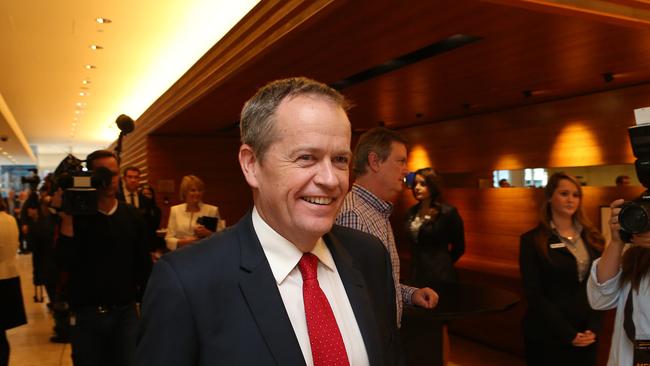National Reform Summit: Co-operation Shorten’s key to harmony
Bill Shorten has called for “collaboration” between unions and business in the construction industry.

Bill Shorten has called for “collaboration” between unions and business in the construction industry and on major projects as he outlined the planks of an industrial relations reform package to boost productivity, should Labor win the next election.
Claiming to reject the “class warfare” and “ideological” conflict that has dogged industrial relations, particularly in the construction industry, the Opposition Leader told the National Reform Summit in Sydney yesterday that “our focus should be upon bringing interests together”.
Mr Shorten is said to be considering a “tripartite” approach — with government, business and unions working together — to lift productivity and improve safety in construction.
The comments come after a spate of police raids on construction union offices around the country, and are in stark contrast to the construction union’s militant attitudes on worksites.
“If we live in a class-warfare world waged either by ideological governments, or unions, we fail,” Mr Shorten told the summit yesterday. “Our focus should be upon bringing interests together. This could start collaboratively in reforming industrial relations in construction and major projects.”
While not mentioning his former organisation, the Australian Workers Union, Mr Shorten invoked his previous career when he said: “Over many years, I have worked practically and co-operatively with businesses to generate productivity gains (including) adopting more flexible hours and leave arrangements to turbo-charge productivity on major projects.” He later said he also wanted better safety, training and “more women encouraged to take up careers in construction”.
“Australian workplaces work best when there’s harmony and co-operation,” Mr Shorten said.
He is understood to be considering laws ensuring “fair” treatment for subcontractors, in what appears to be a response to a raft of allegations against the construction union aired at trade union royal commission hearings in Canberra. The commission heard that contractors in the ACT were coerced into signing union enterprise agreements and frozen out of projects when they refused.
The pressure on the construction union arising from the royal commission has peaked in recent weeks, prompting David Hanna to resign as national president of the union’s construction division amid an investigation into allegations that he took secret commissions.
The Australian Federal Police taskforce attached to the royal commission raided the union’s headquarters in Canberra on Tuesday, seizing computer files and hardware. The CFMEU said yesterday the raid was “nothing other than a political stunt by the royal commission, which is desperately trying to defend its credibility and purpose”.
Police have also targeted senior CFMEU figures in other states, including Victorian secretary John Setka and his deputy, Shaun Reardon, with reports detectives are seeking to slap both men with blackmail charges over the union campaign against concrete firm Boral. And police have taken an interest in NSW CFMEU secretary Brian Parker over his relationship with bankrupt construction businessman and underworld figure George Alex.
Employment Minister Eric Abetz said yesterday: “If Bill Shorten is serious about reforming industrial relations in the construction industry … he could (support) the government’s bill to re-establish the Australian Building and Construction Commission.”




To join the conversation, please log in. Don't have an account? Register
Join the conversation, you are commenting as Logout